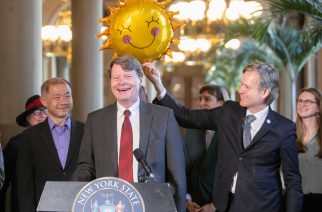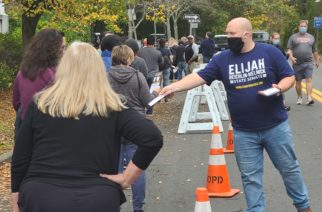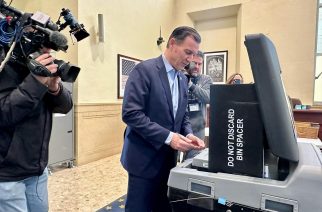With summer winding down and the November elections approaching, the ballot question of “Shall there be a convention to revise the constitution and amend the same” is looming as an important decision for all New York voters that only comes around every 20 years.
The rhetoric by both good government groups supporting a convention, and high-powered special interests who oppose the idea, is heating up as their positions become clearer and more prevalent in news articles and political advertising.
According to the most recent Siena Research Institute poll, support for holding a constitutional convention has fallen from 62 percent in May to 47 percent in July. Only 14 percent of voters in the July poll say they have heard either “a great deal” or “some” about the convention, while 85 percent admit to hearing “not very much” or “nothing at all” about the idea of a convention — a decision that lies solely in their hands.
New York state has not held a constitutional convention since 1967, so there is no recent precedent to serve as a guide to how one might play out. If voters reject the idea again this November, the next opportunity to hold a convention will be in 2037.
With little more than three months to go, the sides are drawn. Citizens Union New York’s push for a “Yes” vote, motivated by what they view as an urgent need for dramatic reforms, is running up against formidable opposition in the New Yorkers Against Corruption, a conglomerate of established Albany power brokers.
This may signal an uphill battle for the coalition pushing for a “Yes” vote.
Conditions seem right for a constitutional convention — neither house of the state Legislature enjoys majority support among voters and there has been a dip in voters who say the state is heading in the right direction.
And on the national scene, one might think that general malaise toward government would be enough to garner support for a shake up.
Despite this perfect storm of discontent, the pro-convention groups seem to be struggling to get the word out as effectively as those urging a “no” vote.
The Siena poll indicates that while there has been almost no movement in the numbers reflecting voters’ awareness of the Con-Con question, the last two months have seen opposition swell.
“In previous Siena College polls, support for Con Con has been overwhelming, including a 62-to-22 percent bulge in May,” said Siena Pollster Steven Greenberg via press release. “Now, however, with a newly worded question which includes what voters will see on the November ballot, support for ConCon is only 47-to-34 percent.”
Greenberg points out however that the drop in these numbers is largely attributable to changing Republican opinion of the measure. Between the May and July polls, Republican support for a holding a convention plummeted, from 55 to 35 percent, while Republicans who oppose a convention grew from 30 to 48 percent.
The poll’s data, however, was not all bad news for the vote “Yes” camp. While support has flagged, nowhere more noticeably than in the Republican ranks, support has by no means disappeared.
“A strong majority of Democrats and a plurality of independents support it, while a plurality of Republicans opposes it,” adds Greenberg. “A plurality of voters from every region of the state also supports it.”

Albany’s Culture of Dysfunction
The motivating forces behind legislation in New York state can be unclear at times.
This past session saw the Child Victims Act — which seeks to extend justice to people sexually abused as children — fail to pass for the eleventh year, despite strong bipartisan support in the Assembly and, according to advocates, enough support in the Senate pass in some form.
The measure even had the backing of the Attorney General and the Governor. Despite this, the bill died after being moved from a committee chaired by Sen. Brad Hoylman, the bill’s sponsor, to a committee headed by Majority Leader John Flanagan, which some claimed was a violation of the Senate’s own rules.
It is worth noting that Sen. Flanagan was formerly “of counsel” to a law firm that represented the Diocese of Rockville against accusations from abuse victims. Flanagan has also regularly voted against legislation viewed as controversial within the church, not just on the CVA but on marriage equality as well as physician assisted suicide.
If perception that one man can single-handedly derail legislation with considerable bipartisan support is not enough to motivate civic-minded New Yorkers, the economic costs of political chicanery has also emerged as a problem in recent years.
On the heels of a major bid rigging scandal that saw a former high-ranking aide to the governor, Joe Percoco, implicated, there have been no meaningful changes to the procurement process made by the Legislature. The media coverage and bureaucratic delays that followed after the allegations went public caused the Austrian semi-conductor manufacturer committed to the project to withdraw its investments in the Utica-area project, costing the region good paying jobs and a tax revenue boon that, like most upstate economies, it badly needs.
Federal corruption charges cannot be the only ethical check on state officials and employees, there should be a state level system in place before the federal government needs to intervene, say good government groups.
Controversy reared its head earlier this year when news broke that several members of the Senate Independent Democratic Conference, who have been heavily criticized for conferencing with Senate Republicans — effectively giving them a majority and control of the Senate — were receiving stipends for heading committees that they actually co-chaired. While the stipend scheme is not technically illegal, it falls into an ethical gray area that, according to Evan Davis, former adviser to Gov. Mario Cuomo, should not exist and could be addressed by the constitutional convention.
“The Legislature appears to think they are above the law,” said Davis, who is serving as the manager of the Committee for Constitutional Convention and the former president of the New York City Bar Association. “I read the memo written by the majority counsel for the Senate. He said it doesn’t matter whether it’s fraud to treat a vice chair as getting the same pay as a chair, because this is a matter of internal affairs for the Legislature. ‘We can do whatever we want.’
“I guarantee we could amend the Constitution very easily and get rid of this above-the-law attitude.”
It’s possible the attitude Davis refers to is born of the inherent lack of accountability in Albany.
Despite embarrassingly low participation from New York voters, there was no movement on election reforms to make same-day registration and early voting a priority in New York, as bandied by Gov. Cuomo in his State of the State earlier in the year and reiterated last month with an executive order aimed at making registration more accessible.
While it does increase availability of registration forms and guidance from state employees on how to properly fill them out, the order stops short of the goals set out earlier in the year.
These all amount to more questions than answers for an electorate that skews liberal.
In a state where elected officials regularly reference its progressive credentials, New York ranked 44 for voter turnout in the 2016 election.
At a certain point, progressive is as progressive does — until New Yorkers get serious and make voting and ethics reform a fulcrum issue this election cycle, equitable representation in the Empire state is a nice idea, but unattainable.
A constitutional convention, supporters say, would bring these issues to light and put solutions in the hands of the people. But a convention could also do more harm than good, say opponents.
“The prospect of a constitutional convention touted by idealists is a complete fraud,” said Jordan Marks, campaign manager for New Yorkers Against Corruption. “We know nothing about the framework of a convention — how much will it cost? What are the rules to run as delegates? Which issues will be considered? How will Albany insiders ensure transparency?
“There is a total lack of information,” Marks said. “We, the people of New York, have zero interest in writing a blank check for corrupt Albany insiders to throw themselves a multi-year party.”
While acknowledging the existence of risks inherent to this process, Citizens Union is leading a campaign for a “Yes” vote, saying a convention is the best chance for New Yorkers to obtain a more equitable state government and take some power away from the Albany establishment.
“Any great forward movement in this country has always involved some risk but also a hope and a dream of a better time and a better life,” said Dick Dadey, the executive director of Citizens Union. “This is what a constitutional convention can provide.”
On the other hand, these risks prove too much to stomach for the long list of groups comprising the vote “No” coalition.
New Yorkers Against Corruption campaign manger Jordan Marks was hesitant to speak with the Gazette on the record, but did share a few of his organization’s talking points. NYAC is a coalition of interest groups that have unified in support of a “No” vote. These advocacy groups include a number of unions, thought by many to be the most powerful lobbying entities in state politics.
Clearly the stakes are high, when Planned Parenthood is sharing press releases with Right to Life.
“There’s a reason why all these groups have come out to oppose: there’s a huge risk, it will cost a fortune, and the process can be totally corrupt by the same people that have caused the mess in the first place,” said Marks.
“If people believe Albany is the problem,” continued Marks, “We’re relying on the same Albany insiders that created this mess to fix it, which is a recipe for disaster.”
NYAC cites the cost, a lack of explicit guidelines related to expenditures and time frames, and the influence of “Albany insiders and lobbyists” as major factors in motivating them to lead the drive for a “No” vote.
“There’s so much at stake for all sides of the political spectrum in New York state,” says Marks. “Everything from a women’s right to choose to environmental issues to second amendment rights, could be considered for a change during a constitutional convention.
“There are no established rules or guidelines. Elected officials can be delegates. There’s no regulation on the amount of money that can come in to influence delegates,” added Marks. “It makes it ripe for corruption.”
While Marks is correct — legislators are not barred from running to be a delegate and effectively doubling their salary — Both the Senate and Assembly leadership, Republican and Democrat, respectively, publicly oppose a convention.
Coincidentally, both sides of the ConCon debate say the greatest threat to New York’s everyman are “Albany insiders and lobbyists.”
Dadey believes that many of the fears laid out by NYAC are unfounded, going as far as calling their message “fear mongering.” A rollback of pension guarantees and the opening up of preserved land like the Catskill or Adirondack Parks are not impossible, but do not have the support of any substantial advocacy groups or interests seeking these changes, according to Dadey. And they would not be popular with voters if they did, who have final say on anything decided by the convention.
“I don’t expect any of this to be rolled back because there’s no constituency for it. There’s no one out there saying ‘we need to do this,’” said Dadey. “All these groups should not be seeing this as a threat to their current protections and entitlements but rather as an opportunity to expand them.”
“We are about hope,” said Dadey of the coalition for the ‘Yes’ vote. “We trust the people to make the right decision, what is often lost in this is, any [proposal] that changes the state Constitution has to come back to the voters, the convention does not have the final word. What’s wrong with trusting the people?”
Protecting the Status Quo
Right down to the name, according to Dadey, New Yorkers Against Corruption is misrepresenting itself to the people of New York. While it does have a nice ring to it, after all, there are not many people on the side for corruption.
According to good government advocates and watchdog groups, it is the existential threat to the current system that has motivated these interest groups. There is no thread of common ideology woven through these organizations aside from the apparatus that they have invested time and resources in, over decades and decades of lobbying and campaign contributions.
“They are not against corruption, if they were there would have been out there calling against Sheldon Silver’s conviction reversal,” said Dadey in an interview with The Legislative Gazette. “They are for the status quo. They want to protect the status quo because the status quo protects their power. It protects the relationships that have been built up over decades that make the place run, but only run for the privileged.”
Convention supporters say the threats facing the public, as listed by NYAC, are sometimes vague, and at other time, embellished.
Take the cost of the convention being as high as $300 million — without any real explanation as to where that number comes from. Or the idea that the convention could go on indefinitely leading to astronomical taxpayer cost. The delegates do decide the rules of the convention, so there are a great number of uncertainties in regard to the process, but it seems to illustrate a basic cynicism and a mistrust in the voting public when these groups say the people selected by the public have no aim but fleecing the very public electing them.
The good government groups and academic think tanks supporting a convention are framing the debate as high powered special interests coming together to quash watchdogs and citizen groups who serve as the only real check on a Legislature with no mechanism for ethical self-regulation. They say NYAC is special interests digging in their heels against change that threatens the business models of the organization’s component parts.
“We have an ethics enforcement method mechanism that is designed to fail,” said Evan Davis. “The governor is entitled to appoint six members and three of them can be Democrats. The law says that if two of those Democrats are opposed to an investigation of the Governor or his top aides, for any reason, it stops. It is designed not to work. This could be very easily fixed by putting an independent ethics commission in the Constitution.”
Davis also said the real risks that establishment legislators are concerned about are insurgent or revolutionary changes to the political process.
“I know that’s a Bernie Sanders word, but it happens to be true, it would work a political revolution in this state, to make these changes,” said Davis. “They want the status quo to be maintained.”
Modern Representation for all New Yorkers
For the vote “Yes” coalition, the prospect of a Con Con is an opportunity to address long standing concerns held by the voting public, issues the Legislature has at times seemed reticent to address. Historically, many of the positive changes that have been made to the Constitution over the years have come out of the convention process, including the environmental protections, the public school system and protections for worker’s rights, all things NYAC claims are under threat from a “Yes” vote.
However, having not held a convention since 1968 — in a contentious convention that many viewed as being hijacked by the Legislature with the changes subsequently voted down by the electorate — the state’s governing document is in need of substantial modernization that the Legislature is either unable or unwilling to undertake.
“This is an opportunity to right the ship and to create a new democracy for the 21st century,” said Dadey on the archaic nature of the state Constitution. “Much of what this government is set up to do is rooted in the late 1800’s — that’s not responsible.”
Bill Samuels, a long-time Democratic activist and the founder of NY People’s Convention, takes issue with the common argument from the vote “No” crowd — that we already have a process to amend the Constitution. According to Samuels, one need not look any further than this past session to debunk that.
“The environmental amendment was written in 1894,” said Samuels. “Our group attempted with environmental advocates to submit this year something simple that I think all of you would agree with: the right to clean water and clean air. It couldn’t get passed.
“Many of us don’t care how change occurs, if we thought it could go through the Legislature we would be all for it, but it’s not happening,” said Samuels.
It’s this very type of political gridlock that has convinced Samuels the time has come for the people of New York to take their legislative futures into their own hands and build a more equitable constitution that looks out for all New Yorkers, not just the ones who had political clout in the 17th century.
“1894, all these delegates, there wasn’t one black delegate, but there was a woman,” said Samuels of the previous Con Cons held. “1938, we got up to 6 women, and one black [delegate].
“Our Constitution and this convention will be representative of all the people and all of its diversity.” added Samuels. “The key years 1894 and 1938 don’t represent New York today and it’s one of the reasons our Constitution is totally outdated.”











